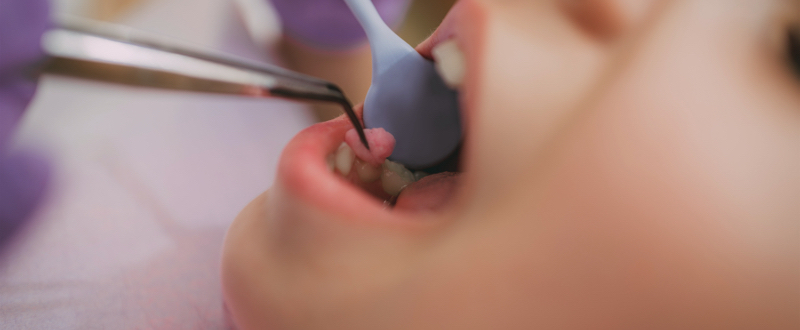
29 Nov How important is tongue scraping to overall oral health?
How important is tongue scraping to overall oral health?
James L. Ratcliff, Ph.D., CEO, Rowpar Pharmaceuticals, Inc., the makers of the CloSYS brand of toothpaste, mouthwash and oral spray (closys.com)
The short answer is “very.” To explain, we need first to step back a bit and look at the mouth. The inside of the mouth is coated with biofilms – slippery, slimy mixtures of sugary materials, sulphur compounds, and bacteria – that attach to the tongue, cheeks, teeth and gums. The biofilm that attaches to teeth, for example, is called “dental plaque.” Each biofilm is different, so biofilms on the tongue have a different mixture of bugs and gunk than those attached to the teeth. Biofilms harbor bacteria, viruses and fungi that may infect tissues and cause disease, so disrupting and removing biofilms is important. And the tongue is an important muscle: it helps you speak, chew, swallow, taste and sense texture, so like other muscles, you want to keep it in shape!
Just as tooth-brushing mechanically gets rid of biofilm on the teeth and gums; tongue-scraping helps get rid of biofilm, bacteria, fungi, and viruses embedded in the tongue. Using a mouthwash regularly helps wash away biofilm from the cheeks, gums, teeth and tongue. Scraping the tongue mechanically helps remove biofilm from the tongue. Mouth-rinsing complements rather than replaces tongue-scraping.
Tongues dry out. Dry tongues are susceptible to infection and allowing them to be even more of a home for sulfur compounds, a primary source of bad breath. So, when you scrape your tongue, you get rid of biofilm and bacteria. But to do a thorough job, it is best to bath the tongue (along with the rest of the mouth) with a mouthwash to rinse away residual matter and sanitize the surfaces.
If you have “dry mouth,” your tongue is dry too. By slowly arching your tongue toward the roof of your mouth and making a clicking sound, you normally produce saliva. Saliva is nature’s mouth rinse. It helps bath the tongue, slowing the process of biofilm formulation and keeping the tongue moist. Using oral rinses and sprays can sanitize the tongue too and help keep it moist.
So, scraping your tongue not only is good oral hygiene, ranking right up there with brushing and flossing, but it also can help prevent bad breath and dry mouth, particularly when followed by a mouth rinse or oral spray. If your mouth rinse tastes nasty, stings or burns after scraping, you have the wrong mouth rinse!
How does tongue scraping fit into a good regime of oral care? There are many variations and protocols for good oral hygiene. Here’s mine:
Begin by flossing. Or use an interproximal pick or brush to get between teeth. You can’t have a clean mouth with garbage growing between your teeth! Put a little toothpaste on the interproximal brush to increase its sanitizing effect. Again, the objective is not just to poke loose food free but also to remove biofilm forming between teeth and to leave the area clean and healthy.
Next, brush your teeth and gums. The object of brushing is as much your gums as it is your teeth. Just as exercise keeps your body in shape; brushing the gums to keep them in shape. Make sure you give attention to all four quadrants of your mouth: upper, lower, right side, left side, inside, outside.
Then scrape your tongue, either with a tongue scraper or with the scraper on the back of your toothbrush (if it has a scraper). Stainless steel, copper, silver and plastic scrapers can be purchased at the drugstore or at online retailers. You can use the brush side of your toothbrush, but it will be less effective in getting bacteria and biofilm from the tongue. Finally, wash and swish your mouth with an oral rinse or mouthwash. You’ll get better results from your tongue scraping if you rinse right afterward.
You will find that between 7 and 14 strokes of the scraper will leave your tongue feeling healthy. Rinse the scraper as needed. If your tongue is sore from scraping, lighten up! You are probably pressing too hard.
Clock yourself to make sure you are giving proper attention: 1 minute for flossing and scraping the tongue, two minutes for brushing, one minute for oral rinsing, twice daily, every day. Your mobile phone has a clock timer which can be helpful.
So, why bother to scrape your tongue? It helps avoid bad breath and can help with dry mouth conditions. Scraping your tongue prepares you to enjoy the flavors and textures of your next great meal. Scraping helps sanitize your mouth and prevent disease from getting a start in your mouth. A healthy tongue helps with your digestive system. Your food begins being digested in your mouth, continues in the process through your stomach, and intestines. With a healthy tongue, you’ll boost your immune system as well as improve your oral health! Remember, a healthy mouth leads to a healthy body.




Sorry, the comment form is closed at this time.